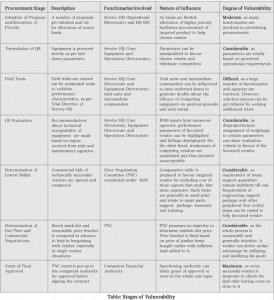Contouring Vulnerability Map
Though, the Government has taken many pioneering and far-reaching steps to make the procurement regime credible and above board, it is essential to identify stages where the system can be subjected to external influences and the degree of such vulnerability. It is only then that appropriate steps can be taken to make the system foolproof.
- Initiation of Proposal and Allocation of Priority. Services Capital Acquisition Plan (for a five year period) contains a large number of approved procurement proposals. As resources are always insufficient to cater for all proposals, only schemes which are accorded higher priority are included in Annual Acquisition Plans. Other proposals remain on paper and get eliminated due to non-availability of funds. Priorities can be skewed to accord higher precedence to a proposal in which a favoured vendor is confident of emerging successful.
Also read: Defence Research: India’s Achilles Heel
- Formulation of Vendor-Centric Qualitative Requirements. Manipulation of parameters to favour a chosen vendor effectively rules out competition. It amounts to creating a single-vendor situation.
- Field Trials. Undue influence can be brought to bear on trial teams to take subjective view of competing equipment, especially in respect of trial parameters which are descriptive in nature and cannot be quantified.
- GS Evaluation. This is the final step in determining whether equipment is technically acceptable or not. Stressing of certain characteristics of favoured equipment and highlighting of minor glitches of the rest can be an effective ploy to play favourites.
Almost all defence deals are shrouded in varying degree of secrecy. Services proclivity for secrecy aggravates the problem. This lack of transparency creates doubts about their probity.
- Determination of Lowest Bidder. It is a complex process as the total expenditure includes basic cost, support equipment, services, spare parts, warranty obligations and repair facilities. Requirement of support backup and infrastructure can be manipulated to bring down the overall quote of the favoured vendor. A smart vendor always keeps his unit cost price at competitive levels but charges exorbitantly for add-ons through small print.
- Acceptance and Implementation of Offset Obligations. Offsets present huge opportunities for unethical practices. According to Transparency International, inadequate attention is being paid to ensure probity in offsets. As regards India, the concept of offsets is in a nascent stage and the Government is still struggling to fine tune it.
- Grant of Final Approval. Once technical and commercial processes are completed, the case is forwarded to the competent financial authority (CFA) for his final approval. No contract can be signed with the successful vendor unless CFA accords sanction. CFA can holdup a proposal indefinitely or raise incessant queries. As the stakes for the successful vendor are exceedingly high at this stage, he may be tempted to resort to unfair means to expedite sanction.
The above susceptibilities should be taken as a broad indicator of areas which need closer supervision. The table below shows degree of vulnerability at different stages.
Ensuring Probity
After having identified vulnerabilities which are prone to unfair influences, it is imperative that infallible preventive measures and safeguards are put in place.
- Selection of Acquisition Staff. This is by far the most important requirement. All checks and controls can be rendered ineffective by ingenious functionaries. They can circumvent all rules and provisions with innovative dexterity. Their proclivity to invent opportunities for manipulation is disquieting. Therefore, it is of utmost importance that acquisition staff be of unimpeachable integrity.
- Enhanced Transparency. Secrecy breeds corruption. Transparency is considered to be the best bet against underhand dealings. The armed forces must curb their propensity to assign unduly high security classification to procurement proposals. Wider publicity through various media will generate competition with resultant reduced scope for favouritism.
- Strict Adherence to Acquisition Time Frame. DPP-2006 has laid down a time frame for completion of different procurement activities. It should be strictly adhered to and all undue delays duly probed. All holdups, either by delays in clearance of files or by raising of irrelevant queries must be looked at with suspicion.
- Logical Determination of Fair and Reasonable Price. Fair and reasonable price of equipment under procurement is determined prior to the commencement of commercial negotiations. A scientific methodology should be evolved lest the whole exercise gets reduced to a subjective exploit. Ingress of infructuous factors to justify higher price bracket must be vigilantly guarded against.
- Evaluation of Commercial Proposals. It is absolutely essential that a matrix for commercial quote is issued with RFP. The matrix should incorporate all facets of the deal, giving total information about what is proposed to be procured. The vendors should be asked to fill in their quote in the given format without any conditions. The aim should be to generate a comparative table of commercial bids on the basis of previously declared requirements. It shall help to select the lowest bidder in a most just, fair and transparent manner.
- Need for Regular Oversight. Defence procurements are prolonged affairs wherein functionaries are required to take major decisions. If an infirmity comes to light at an advanced stage, the whole process may have to be aborted with time and cost overruns. A well structured oversight arrangement can prove invaluable in continuous monitoring to ensure that all decisions taken are above board and in good faith.
- Effective Complaint Handling Mechanism. Every contractual arrangement must have an inbuilt mechanism for handling of complaints and redressal of grievances. As most complaints regarding alleged miscarriage of justice arise from a lack of effective communication, such an arrangement will help to clarify matters and prevent vitiation of the environment.





